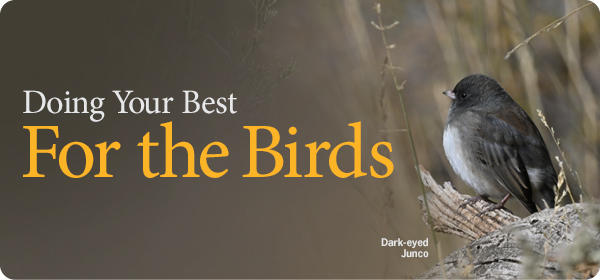Be a Song Bird Hero!
Sometime it’s just hard…hard to feel like we can have a positive impact on this crazy world around us.
Feeling overwhelmed by the events of the past few years, many of us simply retreated to the comfort and serenity of our own backyards to regain a feeling of well-being and some semblance of control. It was all pretty simple, just put out some bird feeders and food and the result was the joy of having birds and nature enhance our world. A gift that kept on giving day after day!
Speaking of having a positive impact, why not consider giving a gift back to nature? It’s not hard, a few simple actions can truly help make the world a better place for birds, wildlife and people, too.
By now, we have probably all heard that bird populations in North America have declined by nearly 3 billion since the 1970s. Birds are in trouble from habitat loss, invasive species, climate change and pesticides. The good news is that when we create safe wildlife habitat in our own yards, and make our homes and lifestyles more bird-friendly, we can help many birds to recover and even thrive.
Here’s a quick list of 7 Simple Actions you can take to help birds and become a Song Bird Hero!
- Make Your Windows Safer - Birds perceive reflections in glass as habitat they can fly through. Make your home’s windows safer by installing screens or using opaque window appliqués, markers, streamers or other commercially available methods to break up the reflections.
- Keep Cats Indoors - Save birds and keep cats healthy by keeping cats indoors. Cats are estimated to kill more than 2.4 billion birds annually in the U.S. This is the #1 human-caused reason for the loss of birds, aside from habitat loss.
- Reduce Your Lawn, Plant Native Plants - With more than 40 million acres of lawn in the U.S. alone, there’s a huge potential to support birds and other wildlife by replacing lawns with native plantings. Native plants will provide shelter and nesting areas for birds, along with food resources like nectar, seeds, berries, and insects.
- Avoid Using Pesticides - More than 1 billion pounds of pesticides are applied in the United States each year. Pesticides can harm birds directly through contact, or if they eat contaminated seeds or prey. Pesticides can also harm birds indirectly by reducing the number of insects that birds need to survive.
- Drink Bird-Friendly Coffee - Three-quarters of the world’s coffee farms grow their plants in the direct sun, after clearing the forests that birds and other wildlife need for food and shelter. In contrast, shade-grown coffee farms preserve the forest canopy which helps more than 42 species of North American migratory songbirds survive the winter, including orioles, warblers, and thrushes.
- Use Less Plastic - Plastic takes more than 400 years to degrade, and 91% of plastics created are not recycled. Studies show that whales, turtles and at least 80 seabird species ingest discarded plastic, mistaking it for food. Reduce your use of plastics by avoiding single-use plastics including bags, bottles, wraps, and disposable utensils. If you do use disposable plastic, be sure to recycle it.
- Watch Birds, Share What You See - You can enjoy birds while helping science and conservation by joining bird tracking projects such as eBird, Project FeederWatch or the Great Backyard Bird Count to record your observations. Your contributions will provide valuable information to show scientists where birds are thriving—and where they need our help.
Indeed, seven simple actions that will have a positive impact in your life and make you a hero to the birds.
To learn more, please visit Save the


